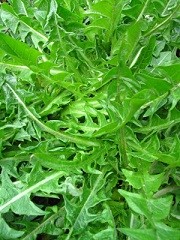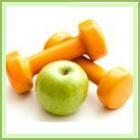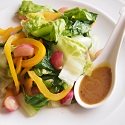Lose Weight
![]() Calories in Food
Calories in Food
![]() Calories in Vegetables
Calories in Vegetables
![]() Calories in Dandelion Greens
Calories in Dandelion Greens
Calories in Dandelion Greens, Dandelion Greens Nutrition
How many calories in Dandelion greens? See below, the Dandelion greens calories for the different serving sizes. We provide you with the Dandelion greens nutrition facts and the health benefits of Dandelion greens to help you to lose weight and eat a healthy diet.
We are probably more familiar with the Dandelion as a weed with a pretty yellow flower. In fact a number of varieties can be eaten, either raw in salads, or boiled.
If you catch wild dandelions in the spring before the plant blossoms, then the greens are great for salads. If the plant has blossomed, then you will need to blanch them to remove their bitter taste, which is similar to chicory.
Dandelion greens are an excellent source of vitamin A, beta-carotene, vitamin C, E and vitamin K.
They are also a good source of vitamins B1, B2, B3, B5, B6, B9, and minerals: calcium, iron, magnesium, manganese, potassium and zinc.
Dandelion greens are good for our digestion and are anti-inflammatory. Other Dandelion greens benefits are said to include acting as a diuretic.
Below are two calorie tables for eating either raw or cooked. We also have a nutrition table. See our vegetable calories comparison chart to compare the calories in Dandelion greens with the other calories in vegetables.
Also, have a look how nutritious Dandelion greens are in comparison to the other vegetable nutrition facts.
All of our calorie and nutrition information is provided by the US Department of Agriculture.

Calories in Dandelion Greens, Raw
Refuse: 0%Scientific Name: Taraxacum officinale
| Serving Size | Calories per Serving |
| 100 grams | 45 kcal (188 kJ) |
| 1 cup chopped, 55 grams | 25 kcal (103 kJ) |
Dandelion Greens, Cooked, Boiled, Drained
Refuse: 0%| Serving Size | Calories per Serving |
| 100 grams | 33 kcal (138 kJ) |
| 1 cup chopped, 105 grams | 35 kcal (145 kJ) |
Dandelion Greens Nutritional Information
| Nutritional value per 100 g (3.5 oz) | |
|---|---|
| Proximates: | |
| Water | 85.60 g |
| Energy | 188 kJ (45 kcal) |
| Carbohydrates | 9.20 g |
| Sugars | 0.71 g |
| Dietary fiber | 3.5 g |
| Fat | 0.70 g |
| Protein | 2.70 g |
| Minerals: | |
| Calcium, Ca | 187 mg (19%) |
| Iron, Fe | 3.1 mg (17%) |
| Magnesium, Mg | 36 mg (9%) |
| Phosphorus, P | 66 mg (7%) |
| Potassium, K | 397 mg (8%) |
| Zinc, Zn | 0.41 mg (3%) |
| Copper, Cu | 0.171 mg (9%) |
| Manganese, Mn | 0.342 mg (17%) |
| Selenium, Se | 0.5 mcg (0.7%) |
| Vitamins: | |
| Vitamin C | 35 mg (58%) |
| Thiamine (Vit. B1) | 0.190 mg (13%) |
| Riboflavin (Vit. B2) | 0.260 mg (15%) |
| Niacin (Vit. B3) | 0.806 mg (4%) |
| Pantothenic acid (B5) | 0.084 mg (1%) |
| Vitamin B6 | 0.251 mg (13%) |
| Folate (Vit. B9) | 27 mcg (7%) |
| Vitamin A | 10161 IU (203%) |
| Vitamin E | 3.44 mg (17%) |
| Vitamin K | 778.4 mcg (973%) |
| Percentages are relative to US Recommended Daily Intake (RDI) for adults. | |
Author: Lana Soko
You Might Also Like:
Like This Page?
|
Share This Page:
|
Search Our Site:

Free E-Book:
We Recommend:
Looking to get your body into great shape? Get the very best results for your efforts and money! Save your valuable time from surfing the internet. These are theBestselling Weight Loss Programs

Programs that work and have thousands of satisfied customers worldwide!

 |




